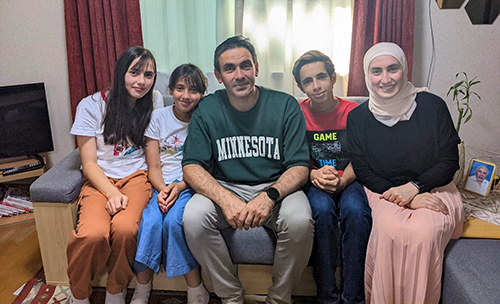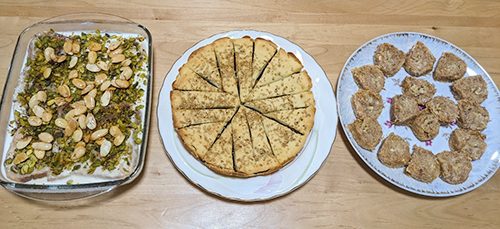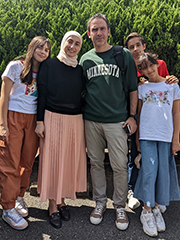My Father is a JICA Scholar and My Future Dream is... ≪a Syrian family looking back for 3 years with series of challenges in Japan≫
2023.01.04

Mr. Samer Zydia, a graduate student of Hiroshima University, came to Japan three years ago with his wife and three children as an international student under the JISR program. He decided to study in Japan because he thought it was the best place for his children's education. Now, Mr. Samer and family look back their life for 3 years in Japan, and children share the dream for the future!
He has 3 children; Yahya is in the third grade and Mariam is in the second grade of junior high school, and Lara is in the fifth grade of elementary school.
Interview was conducted in Zydia's home where the different types of delicious and good-smell Syrian sweets were prepared, which were made by his wife, Mrs. Hebah Jamjoom welcomed the interviewer.

Aish el Saraya (left): Bread soaked in cream and topped with various kinds of nuts
Baklava (center): date cake
Mabruma (right): baked nut cake
The interview began with these wonderful sweets.
Here introduce you the series of questions asked to them.
(*) Zydia's family was evacuated from their home country of Syria, where the civil war broke out, to the neighboring country of Lebanon.
It became more and more obvious through the interview that living in Japan, where the culture and customs are totally different from where they have lived, is tough and challenging. However, each of the family member showed the positive and cheerful attitude to work hard to overcome the difficulties for their future dreams
Here are the answers from Samer's family!
⟨Samer⟩.
At the time, I had been accepted to two scholarship programs abroad, one of Japan and the other of England. Comparing these two countries, I chose Japan. It was because I thought the educational opportunities for children is better in Japan.
In Lebanon, where I lived before coming to Japan, I worked as a chief engineer for a construction company, so my life was relatively affluent and my children attended a private school with good educational level. However, the economy in Lebanon was unstable, and I was worried about the future and whether I could continue to provide my children with a good education. Thus I decided to come to Japan. A year after our arrival in Japan, our fears became a reality, and Lebanon's economy has deteriorated rapidly and is now in a very difficult situation. In this sense, I feel that we were lucky to "survive" coming to Japan from Lebanon.
⟨Samer⟩.
To be honest, I did not expect it to be this much difficult for my children to study in Japan. Before coming to Japan, I had investigated a lot on Japanese education. I found there is a variety of educational programs in Japan, which made me chosen Japan. However, contrary to my expectation, there was only one school which my children could actually go in the area. And since English is not widely spoken in Japan, it was very difficult for both me and the school teachers to communicate what we wanted to explain to each other at the first.
⟨All the children⟩ Very surprised!
⟨Lara⟩ I didn't know anything about Japan and I never thought I would come here. But I was very excited to learn a new language and making new friends.
⟨Hebah⟩ I had an image of Japan as a country with very advanced technology, where everything is done automatically by just touching a button.
⟨Yahya⟩ I had seen the toilets with various functions in videos, so I was very excited when I came to Japan and saw them in real.
⟨Mariam⟩ For me, it was different from what I had imagined. I heard from my parents that Japan is a country of great technology, but so far, I think it is not that much. However, I found Japan is a clean country with no trash in the street.
⟨Samer⟩ I think my children started to understand Japanese within a year after coming to Japan.
⟨Hebah⟩ Lara, the youngest, was the first. I guess the younger learns language faster than elder. Within six months, she was able to understand Japanese. But it was the eldest, Yahya, who knows the Kanji the most. Yahya loves Kanji and his teachers tell us that he is good at it.
⟨Lara⟩ Same. I don't feel much difference.
⟨Mariam⟩ Japanese schools have more subjects. There was no music in Lebanese school.
⟨Yahya⟩ Because of my Japanese language skill, I don't have as many friends in Japan as I did in Lebanon.
⟨Lara⟩ All subjects. I especially like Physical Education and Arts and Crafts.
⟨Mariam⟩ English. I studied at school in English in Lebanon, so I am good at it.
⟨Yahya⟩ Physical Education and Industrial Arts. In Industrial Arts, we do various activity such as making bookshelves, radio, and computer learning.
⟨Samer⟩ When I try to integrate into Japanese society, I often feel that I have to think and act same as Japanese people and adapt to the Japanese way of behavior. I think Japanese people are kind and there is no discrimination, but I find it difficult to be accepted unless I do the same as the Japanese. But it is difficult to be 100% Japanese. So, even if we are different from the Japanese, I hope that Japanese people would accept the differences and accept us as we accept the Japanese way.
⟨Mariam⟩ In order to accept differences, I think it is better to see, hear, and experience more things outside of Japan. For example, checking the social media of different countries could bring new point of view comparing just checking the one in Japan.
⟨Hebah⟩ But I think the new generation is accepting differences. So I am sure the younger generation is being changed little by little. By the way, Lara has different experience from that of us.
⟨Lara⟩ The first day I went to school, I felt I was welcomed warmly, so I didn't feel there was a barrier.
⟨Lara⟩ I would say yes, but I would also like to visit other countries.
⟨Yahya⟩ When I lived in Lebanon, I visited many places in the country, but I have not been able to visit anywhere in Japan. If I could go to the Kanto area, I would like to visit Tokyo and Mt. Fuji
⟨Mariam⟩ I would like to visit Tokyo, but I don't think I would like to live there because it seems too busy and crowded.
⟨Lara⟩ I'm not sure yet!
⟨Mariam⟩ I like using colors and I like the Arts subject, so I want to be an illustrator or something related to painting.
⟨Yahya⟩ I want to be a programmer. I also want to be the president of a popular game company.
⟨Hebah⟩ I want to work as an architect, making use of my specialty.
⟨Samer⟩ My goal is the future that my children have a good life. I want my children to enter university and achieve their dreams. That is my goal of coming to Japan. If I can achieve that, after that, my dream is to have my own architecture firm. And I would like to return to Syria someday. Syria is not in a situation which I can go back now, but when the time comes, I want to take all experiences and skills I gain in Japan back to Syria.
It is a wonder that all the Japanese people who visited Syria say they love Syria and Syrians. This could be because of the affinity between Syrians and Japanese people, as well as because of the kindness and hospitality they experienced during their stay in Syria, which made them feel gradually closer and closer to Syrians. This story of interview visit to the Samer's family could be a good example to help you understand this episode.

Syria is still in the midst of a civil war, and the Syrian people are still facing severe circumstances. That is why the Syrian people who were able to come to Japan on the same program as Mr. Samer are all saying how grateful they are to the program because it changed their lives. The interactions/communications with people from overseas, for example JICA Participants, might be a culture shock for Japanese. However, it changes Japanese society little by little in a positive way as well.
It is natural for Japanese and foreigners to have different ways of thinking and values that have been nurtured by upbringing, culture, customs, etc., and we are sometimes surprised by these differences. However, if you accept, enjoy, and adopt the good aspects of these differences, you may come to understand and become close and kind with the foreigners in your life.
scroll